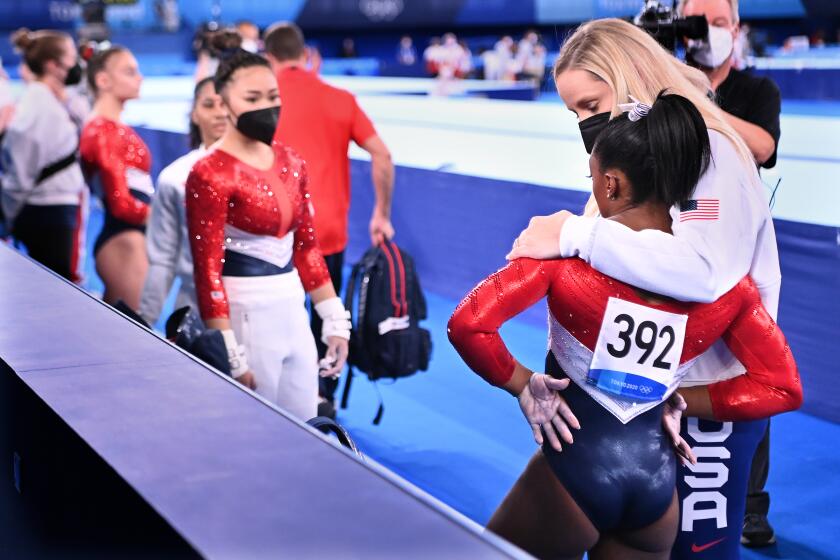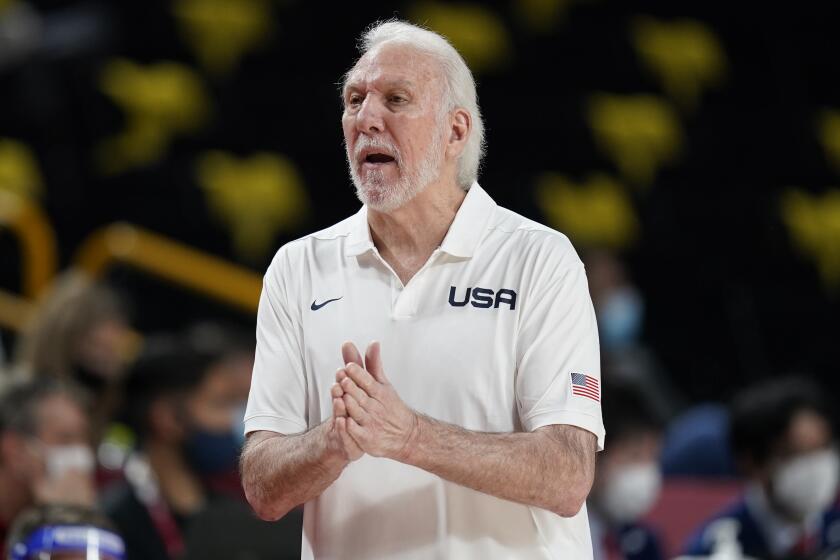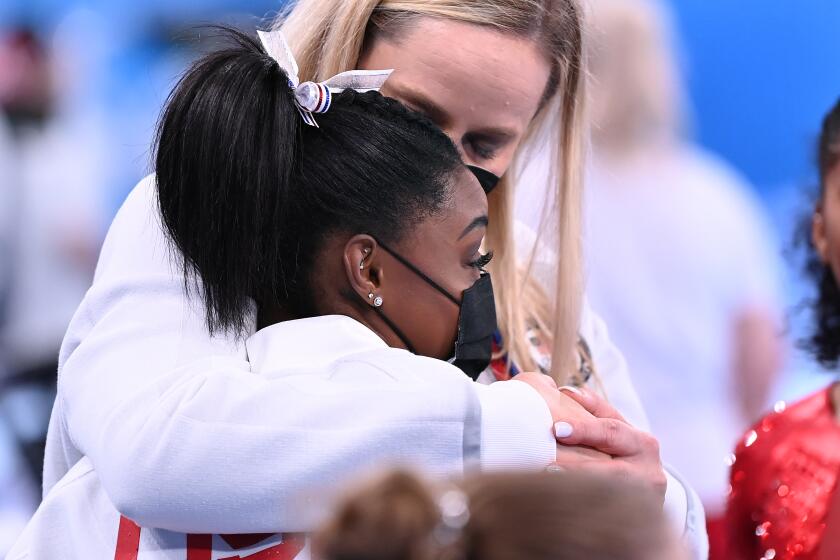A stormy 24 hours: Stars in unexpected trouble at increasingly turbulent Tokyo Olympics
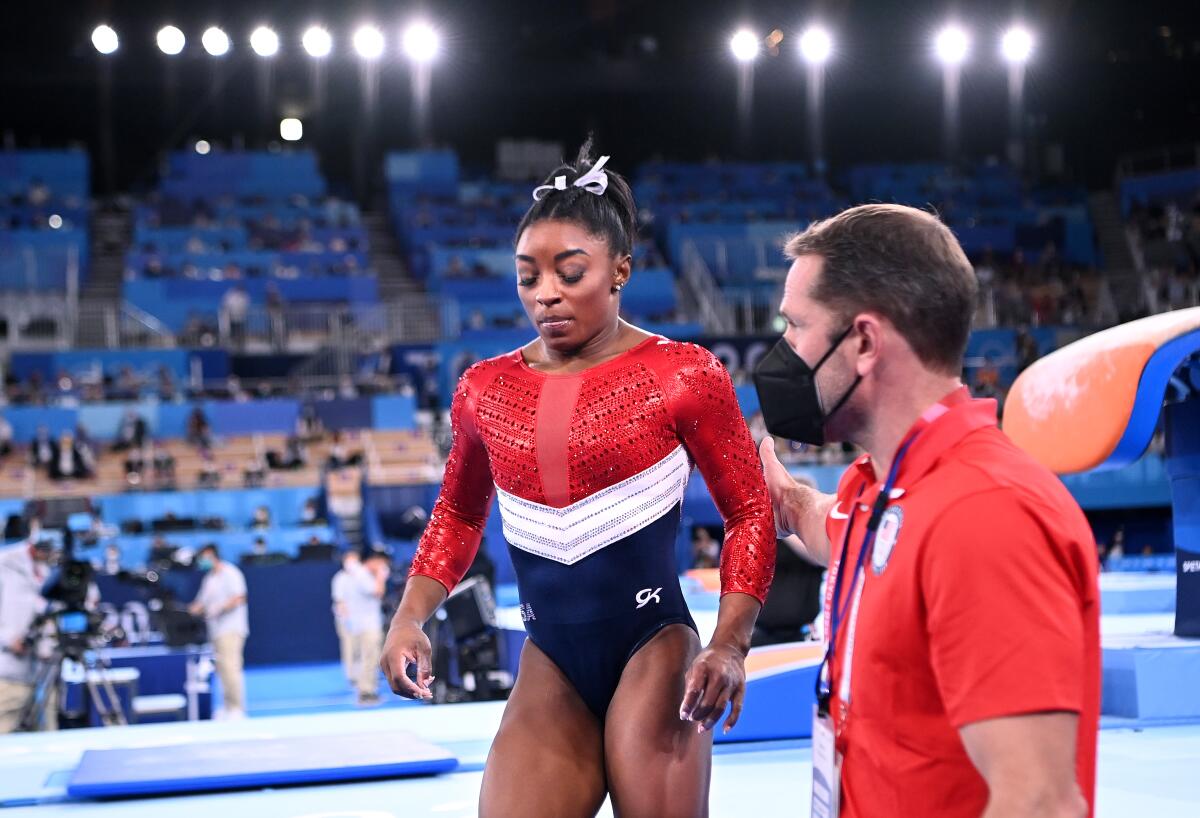
- Share via
TOKYO — These Olympic Games were always walking a tightrope, right from the beginning, teetering on the edge of disaster.
From the first positive coronavirus test, there were fears the COVID-19 pandemic might land scores of athletes in quarantine, maybe wipe out an entire event like the men’s 100-meter final.
From the first explosion of fireworks over an empty stadium during the opening ceremony, there were doubts that Tokyo could generate any real buzz without fans in the seats.
Elliott: Simone Biles pulls out of women’s gymnastics final, lets world know it’s OK to not be OK
U.S. gymnast Simone Biles says her belief you must ‘put mental health first before your sport’ prompted her to withdraw from team competition.
But the Games instead are troubled by a different problem. The mental stress that drove Simone Biles to abruptly withdraw from the women’s gymnastics team competition on Tuesday night underscored a more alarming trend.
These Olympics are losing their star power.
Biles was merely the latest marquee name to suffer misfortune in the last few days. American swimmer Katie Ledecky — another ostensible “Greatest of All Time” — finished second in her initial race and fifth in another, before winning a gold medal in her last race Tuesday. Japanese tennis star Naomi Osaka, whose face adorns countless billboards and television commercials in this country, was bounced from the women’s draw in the third round.
“I’m disappointed in every loss,” Osaka said, “but I feel like this one sucks more than the others.”
There have been bright moments in Japan. The host nation got early gold from skateboarder Yuto Horigome — another highly publicized athlete here — and in sports such as judo and table tennis. Victories by 17-year-old Alaskan swimmer Lydia Jacoby and Carissa Moore in the inaugural surfing contest provided the American team with highlights.
“It was crazy,” Jacoby said after the surprising 100-meter breaststroke. “I knew I had it in me, but I wasn’t really expecting a gold medal.”
Still, the list of disappointments has run considerably longer.
Two-time Wimbledon champion Andy Murray of Britain withdrew from singles, deciding to give his body a rest by playing only doubles. Positive coronavirus tests derailed Jon Rahm of Spain, the world’s top-ranked golfer, and Bryson DeChambeau of the U.S., ranked No. 6, before the start of play.
The powerhouse U.S. women’s soccer team has looked shaky, barely escaping pool play with a 0-0 draw against Australia, and the men’s basketball team, stocked with NBA talent, hasn’t played any better.
“I think that’s a little bit of hubris if you think the Americans are supposed to just roll out the ball and win,” Coach Gregg Popovich said.
Hernández: Gregg Popovich needs to take blame for the underperforming U.S. men’s basketball team
Gregg Popovich is one of sports’ most admired voices for his willingness to take a stand, but his words at the Tokyo Olympics fall short of accountable
So what does all this mean for the Olympics?
“It was already a very troubled Games with all sorts of issues,” said Jason Chung, an assistant professor of sports management at the University of New Haven in Connecticut. “Losing top stars from around the world doesn’t help.”
If anything, the International Olympic Committee has seen its global brand become more dependent on celebrity in recent decades, with television broadcasters paying billions in rights fees. Those broadcasters want recognizable names they can showcase to the public.
U.S. gymnast Simone Biles was scratched from the team competition and the U.S. went on to finish second behind the Russian Olympic Committee team.
“That’s certainly true since the professionalization of the early 1990s,” said Victor Matheson, an economics professor who studies the business of sports at the College of the Holy Cross in Massachusetts. “It’s not hard to look back at the first men’s Dream Team [in 1992] being a watershed moment.”
U.S. television viewership through the opening weekend in Tokyo was down and Matheson expects to see continued lower ratings in comparison to previous Summer Olympics in London and Rio de Janeiro. He wonders if the International Olympic Committee and local organizers are facing a perception problem they cannot solve.
“There was no chance of these Games being remembered as anything but disappointing — they were doomed from the start,” he said. “They were always going to be remembered as the Games without fans, or the Games where more athletes were disqualified by COVID tests than by doping tests.”
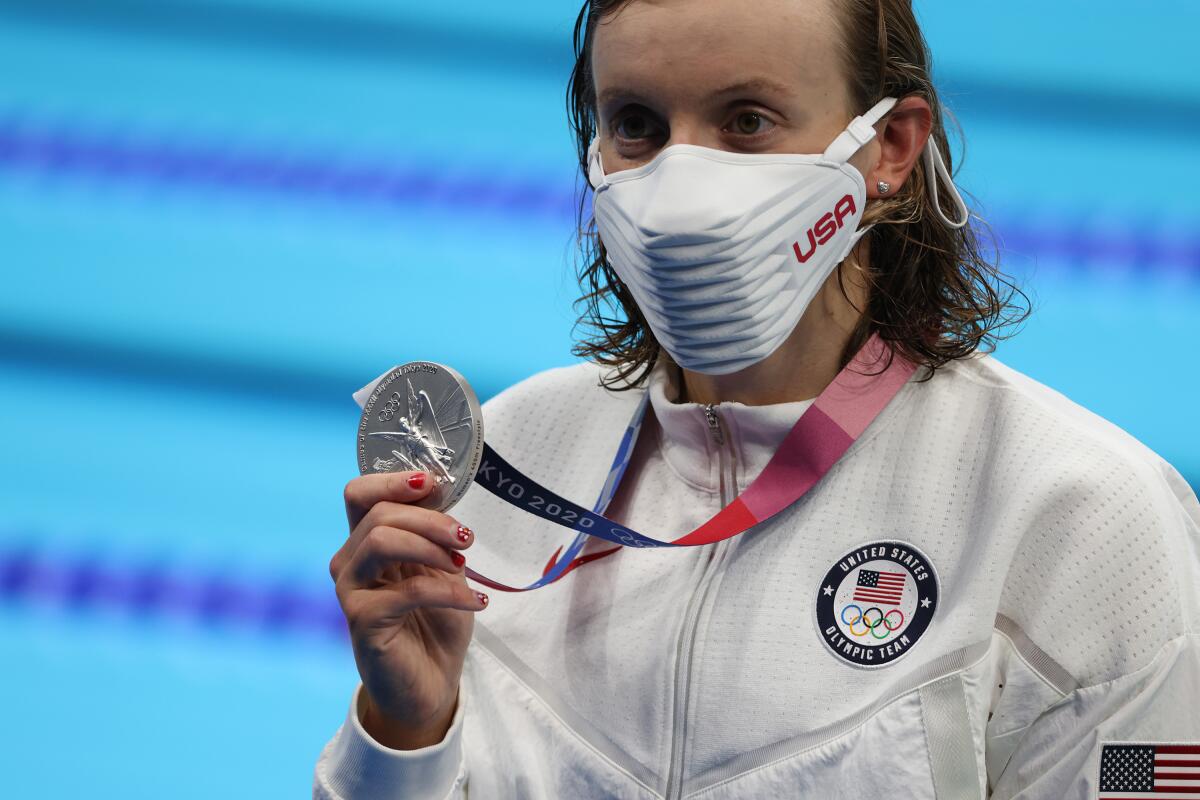
All of which puts the Games in a deep hole with lots of digging to be done.
Biles could help. Though facing some detractors, she has received a wave of support on social media over the past 24 hours and, speaking with reporters, sounded as if she might compete in the all-around and individual events beginning later this week.
“Just a lot of different variables and I think we’re just a little stressed out,” she said, adding that “we’re going to take it a day at a time.”
Given the very personal yet very public circumstances of Biles’ withdrawal on Tuesday, Chung believes her return could become an even bigger story.
“I could imagine it bringing more viewers because of the human-interest angle,” he said. “Having someone of her magnitude and ability struggling emotionally, people might be interested to see how she weathers the storm.
“Also,” he said, “she could draw younger viewers who connect with that kind of authenticity.”
News, results and features from The Times’ team of 12 reporters who covered the Tokyo Olympic Games in the summer of 2021.
In the days to come, the U.S. women’s soccer team and men’s basketball team could find their rhythm and reach the medals podium. Ledecky still has one individual race race left and the start of track and field competition on Friday holds the promise of introducing new stories and new stars.
But the city of Tokyo reported a record three-day average of 2,848 new coronavirus infections on Tuesday, with health experts warning the numbers might continue to grow. That doesn’t bode well for a massive sports event already viewed with suspicion by the public.
Even more athletes could be pulled from competition by positive tests. Some of them could be big names. For these Games, things could get even worse.
After all, there are still 13 days to go.
More to Read
Go beyond the scoreboard
Get the latest on L.A.'s teams in the daily Sports Report newsletter.
You may occasionally receive promotional content from the Los Angeles Times.

